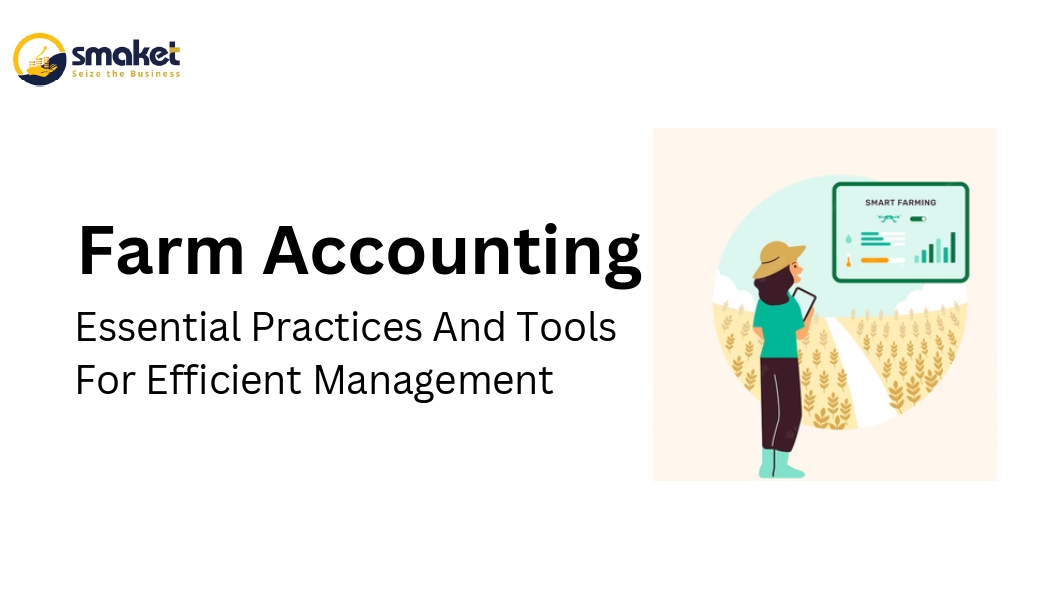Every firm needs sound financial management and accounting procedures to expand and succeed. The same is true for the agriculture sector, which deals with particular difficulties and complexities. To handle the complexity inherent in farm accounting, one must have a thorough awareness of farming operations and specialised expertise.
Farm Accounting: Key Considerations and Practices
Unique Aspects of Farm Accounting:
Farm accounting differs from regular commercial accounting because of the specific needs of the agricultural sector. Agriculture businesses present unique management challenges due to their multiple commitments, costs, and indications. Legal compliance, weather variations, agricultural unpredictability, price swings, and labor dynamics are some of the factors that make farm accounting difficult.
Cash Method vs. Accrual Method:
Contrary to traditional commercial accounting, farm accounting usually use the cash approach. As a result, only cash receipts are recorded as income, and only checks that are ready for deposit are recorded as expenses. In contrast, the accrual approach tracks income and expenses as they are incurred, regardless of cash flow. Understanding the differences between the cash and accrual systems is essential for accurate agricultural accounting and adherence to the matching principle.
Land as a Financial Asset:
Agricultural land should be viewed as a significant financial asset. All maintenance costs, including those for pest control, irrigation, pH regulation, and fertilizer use, should be meticulously documented. These records contribute to painting a complete picture of the farm’s monetary security and long-term viability.
Effective Stock Management:
Stock management and tracking are essential for livestock-based production. The worth of the livestock is regularly determined by keeping track of the number of animals, births, and deaths during particular periods. To appropriately represent the farm’s financial situation, reliable records of stock changes must be kept.
Syncing Accounting with Government Regulations:
Governments frequently designate certain age ranges and animal maturity levels for classification. To meet the governmental age requirements, farmers must synchronise their accounting calendar with these rules. Farmers may simplify bookkeeping and assure compliance by planning livestock breeding appropriately.
Depreciation and Equipment:
Tractors, trucks, harvesting equipment, and hand tools are just a few examples of the different pieces of equipment that are frequently used in farming operations. Farmers also need to be aware of depreciation regulations and take into consideration how equipment values diminish over time. For effective farm accounting, it’s crucial to take full advantage of the tax benefits connected with new equipment while effectively managing depreciation.
Accounting for Losses:
In farming, weather conditions are important, and unplanned events might result in crop losses or bad harvests. Such losses must be reported by farmers since they may increase tax obligations. Accurate record-keeping helps maintain financial openness and guarantees that farmers don’t pay taxes on losses.
The Benefits of Farm Accounting Software:
Streamlined Farm Management:
The careful daily duties involved in farming make account management and financial data analysis time-consuming. The use of integrated solutions is made possible by agricultural accounting software. It also enables farmers to effectively track stock, keep an eye on receivables and payables, and manage their finances while on the road.
Enhanced Data Accuracy:
For efficient farm accounting, preserving correct data is essential due to the numerous metrics and intricate elements involved. Farm accounting software reduces mistakes and assures data correctness by taking the place of human record-keeping and data entry. This lowers the possibility of errors in judgement and makes it easier to make well-informed decisions.
Expedited Payments:
Farmers depend on prompt payments. They may quickly send invoices to customers, reminding them of future due dates, by using accounting software. Farmers may improve cash flow and also prevent late payments by optimizing the invoice-generating process.
Transition to Paperless Bookkeeping:
Typical paperwork associated with traditional farming methods includes invoices, ledgers, and balance sheets. By using accounting software, farmers may go paperless and drastically reduce their paper waste. Farmers may reduce clutter and better organize their financial records while promoting environmental sustainability by adopting online bookkeeping.
Valuable Insights and Reporting:
Farmers may find it difficult to organize their finances owing to the complexity of the sector. Real-time data on sales figures, earnings, losses, and other crucial financial information are provided by farm accounting software. Farmers are better able to plan for the future and make knowledgeable business decisions when they have access to precise data and thorough reports.
Conclusion:
Due to the distinctive characteristics of the agricultural business, farm accounting demands specialized expertise and attention to detail. The complexity of farm accounting, such as land management, animal tracking, governmental requirements, depreciation, and also recognizing losses, must be understood by farm owners. Using Farm Accounting Software simplifies processes, enhances data accuracy, speeds up payments, and offers insightful data for wise decision-making. Farmers may improve their financial management and contribute to the long-term prosperity of their farms by following effective accounting practices and utilizing technology.
FAQ:
1. What distinguishes agricultural accounting from conventional commercial accounting?
Due to the distinctive characteristics of the agriculture industry, farm accounting is distinct from ordinary corporate accounting. Managing living products, such as cattle and crops, provides unique issues in farming. Accounting for farms takes into account things like farming assets, obligations, expenses, unforeseen circumstances (such the weather), and adherence to agricultural laws. Contrary to the accrual technique used in ordinary corporate accounting, which records income and also costs as they are paid or received, the cash method is frequently employed in farming.
2. How can farmers effectively manage their stock for accurate accounting?
Effective stock management is essential for accurate farm accounting, and farmers should keep meticulous records of the number of animals, births, and also deaths over specific time periods. By regularly updating these records, farmers can determine the value of their livestock accurately. Accurate stock management also enables farmers to make wise choices regarding breeding, sales, and long-term planning.

